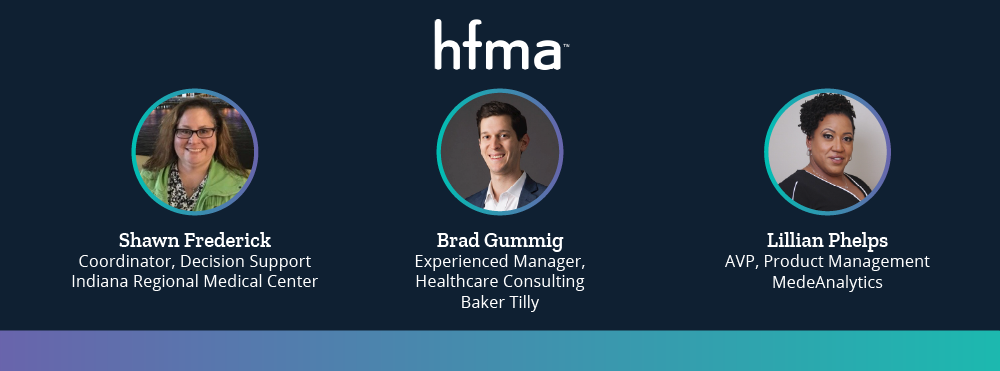
Indiana Regional Medical Center (IRMC) is a 166-bed, not-for-profit sole community hospital that has been serving Indiana County and surrounding communities since 1914. Shawn Frederick, Coordinator, Decision Support, IRMC, Brad Gummig, Experienced Manager, Healthcare Consulting, Baker Tilly, and Lillian Phelps, AVP, Product Management, MedeAnalytics, delivered an engaging presentation at the HFMA annual conference in Denver on data driven, cost-effective care and the incredible transformation taking place at IRMC. Below is a recap from that session highlighting IRMC’s journey to financial sustainability.
Encountering challenges across service lines
IRMC was grappling with a number of challenges across their major service lines—Cardiology, General Surgery, Orthopedics, Women’s Health and Oncology—including:
- Manual, time-consuming analytics: Forced to piece data together from several systems
- Limited reporting: Siloed cost-center performance lacked transparency into service line performance
- Minimal tracking: Mostly unable to holistically monitor and track service line trends
- Lack of unification: Insufficient continuity across the organization at large
In the words of Shawn Frederick, CHFP, Coordinator of Decision Support at IRMC, “We were struggling with getting the data out of our system in an easy format to use for reporting and analytics. We wanted to provide reports that were meaningful and could be acted upon with confidence when making decisions. We wanted to be able to then monitor the impact of those decisions and adjust as necessary.”
Partnering with experts to address issues
To take on these challenges, IRMC partnered with Baker Tilly (leading advisory CPA firm) and MedeAnalytics. This collaborative group identified the following goals:
- Achieve consolidated, user-friendly reporting (without the need for specialized skills)
- Rally leadership around analytics to assist in review of priority service lines and to identify service line champions
- Set up enterprise access to service line insights in digestible formats (e.g., dashboards)
- Identify and act upon expense and revenue opportunities across supply consumption by provider, payer reimbursement analysis and performance
In the beginning, this collaboration focused on Orthopedics and General Surgery due to the high costs and competition for supplies and physicians. After experiencing great results and insights into these service lines, they expanded this approach to other service lines as well.
Generating powerful impact
With the support of Baker Tilly and the tools of MedeAnalytics, IRMC was able to start generating reports and dashboards in minutes instead of weeks, without using SQL or other specialized skills. They also began gathering previously unknown insights about service lines, including DRG downgrade analysis, supply cost & utilization by physician, denial analysis by commercial payer, service line reimbursement analysis by payer, and much more.
Let’s explore two quick examples.
1. Uncovering variations in supply item utilization and cost by physician
Using executive dashboards, IRMC has rapid access to easy-to-consume, physician-level reporting on supply and cost utilization. They also can drill-down to claim, billing and materials management supply details in just a few clicks—enabling rapid discovery of its root cause.
Equipped with this information, IRMC has begun data-driven discussions and organization initiatives. As a result, the organization uncovered a single physician outlier resulting in $11,000 more in supply expense per case than the average for Major Hip and Knee Joint Replacements (MS DRG 470).
2. Identifying potential underpayments and other revenue opportunities by commercial payer
After deploying opportunity exploration by service line and DRG/procedure-level of detail, IRMC can now view comparisons against payers or like-services to identify actionable revenue insights. They are also able to drill-down to 835 and transaction detail in just a few clicks to discover root causes swiftly and simply.
These innovations allowed IRMC to identify $600,000 of total variance in payments annually for one payer compared to top payers across three major service lines.
Summarizing the story
In short, Baker Tilly and MedeAnalytics worked together with Indiana Regional Medical Center to develop robust action plans and implement powerful analytics tools. This unique collaboration resulted in incredible results:
- 10+ disparate data sources ingested
- 1 unified reporting solution inclusive of claims, remittances and patient accounting
- 8+ cross-functional departments engaged in improvement opportunities
- $500,000 in potential savings identified related to supply item variation in orthopedic cases
- $600,000 in potential additional reimbursement identified related to one payer
To quote Bob Gongaware, CFO of IRMC, “One thing missing from our healthcare system reporting was easily accessible cost data associated with our supplies and pharmacy expenses. Now, we are able to dig deep into our data to identify and prioritize service lines to take action on, and confidently make the changes and decisions necessary to improve our overall profitability and patient quality.”
What’s next for IRMC? The sky is the limit. In the near future with the continued support of Baker Tilly and MedeAnalytics, IRMC leadership plans to continue adding physician champions to dig further into the data, taking anecdotal observations and marrying that to the data to show the real story. By working more closely with physicians themselves, IRMC is building confidence in the data and encouraging engagement with open, data-driven discussions that make an impact.
Get our take on industry trends
Providers: Are you ready to be audited?
By Donna Kennedy In 2020, regular audits conducted by CMS and other payers were paused or significantly reduced as the…
Read on...From Insights to Action – The Digital Transformation of Healthcare in the Post-Pandemic “New Normal”
In November, MedeAnalytics hosted the 2021 Impact Summit, an engaging and educational event held annually and designed exclusively for our…
Read on...2022 Rx: Your new, post-pandemic prescription for success
By Dave Schweppe, Chief Analytics Officer, MedeAnalytics Despite the common use of the term “post-COVID,” most leaders across the healthcare…
Read on...Combating the opioid epidemic in North America with Nobel Prize winning research
American Researchers Dr. David Julius and Dr. Ardem Patapoutian from California were awarded the Nobel Prize in medicine for their path breaking work on the development of non-opioid painkillers, showing immense promise for combating the epidemic.
Read on...



